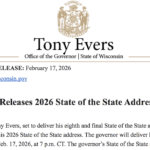A pithy shorthand some Democrats have used in campaigns in the last decade refers to the need to break up the school to prison pipeline. As if people’s choices in life do not matter. Nevertheless, if folks of any political stripe feel like stepping up to improve schools and or the conditions of those who do end up in prison, now would be a perfect time.
Wisconsin’s prisons are a mess. They’re physically deteriorating, are over crowded and have a significant worker shortage. Held hostage by those in his party who believe the criminal justice system is unfair, the governor refuses to build more capacity or even replace aging institutions in Green Bay and Waupun. Now, his beleaguered head of the Department of Corrections has quit.
Wisconsin prison chief retires amid guard shortage; departure another personnel headache for Evers |Associated Press
Carr struggled through his tenure with overcrowded prisons. As of Friday, the adult prison system housed 22,275 people, about 4,700 prisoners over capacity. Problems have been exacerbated by a lack of guards; as of Friday, the guard vacancy rate across the prison system stood at 26.3%.
The shortage of guards grew so severe last year that prisons in Green Bay, Waupun and Stanley instituted lockdowns.
Three inmates died at Waupun in 2023. Dean Hoffmann killed himself in solitary confinement in June. Department of Corrections spokesperson Beth Hardtke said Friday that the Dodge County Sheriff’s Office was leading an investigation into the other two inmates’ deaths. Sheriff Dale Schmidt said the investigation is still active and declined to comment further.
The status quo is unfair to Wisconsin taxpayers, the prison guards and the prisoners. To date there is no plan to correct the department of Corrections. We’ll keep you posted if there are any developments.
Our friends at the Wisconsin Institute for Law & Liberty recently released their 2024 School Data Dashboard, which equips parents and taxpayers with data to see how school districts across the state are performing. The state’s largest, urban districts get a lot of (justified) bad press, but the issues with school performance and absenteeism are not merely big city problems.
The results are in, rising absenteeism in rural communities and urban academic decline | WILL
WILL developed the School Scorecard Dashboard as a one-stop-shop for all to view Wisconsin school districts’ trends in enrollment, proficiency, district funding, administrative staffing levels, and the like. The user-friendly resource uses information imported from the Department of Public Instruction.
Some key findings from this year:
- Chronic absenteeism is prevalent in rural school districts. Of the top 20 worst schools for absenteeism, 13 are in rural, small-town communities.
- Academic ratings in urban centers like Milwaukee and Beloit continue to rank at the bottom.
- Whitefish Bay has the top ACT scores in the entire state.
Things aren’t exactly booming in the state’s economy, either.
Wisconsin tax collections remain roughly even year over year in January | The Center Square
Wisconsin was nearly even year-over-year on its tax collections in January and the state has collected 0.3% more taxes so far for the fiscal year than the year before, according to a report from the Department of Revenue.
Sales tax collections were up by nearly $14 million in January and $67 million year over year. The state has collected $3.9 billion this fiscal year.
Excise tax collections were down 9.6% in January and are down 6.0% for the fiscal year.
However, the Governor did sign a Republican measure to increase the child tax credit for Wisconsin families. This will provide a bit of relief for families combatting the rising price of…well, everything.
Gov. Evers approves bill that dramatically expands Wisconsin’s child care tax credits | WLUK
Under the bill, the state child care tax credit expands to 100% of the claimants’ federal child care tax credit, up from only 50%. The amount of maximum eligible expenses under the state credit would grow from $3,000 to $10,000 for one child. Families with two or more kids can claim up to $20,000, an increase of more than $10,000…
The child care tax credit comes days after Evers rejected three other tax credit bills. Those bills would have expanded Wisconsin’s second or middle class income tax bracket, increased the marriage credit and increased income exemptions for retirees.
Maybe it’s the recent unseasonably warm weather, the fantastic, short-handed, come-from-behind victory by the Bucks last night, or we’re inspired by the possibilities of the upcoming spring: We are confident today is going to be a great day.
We’ll be back again tomorrow with the news you need to stay informed, but not overwhelmed.














